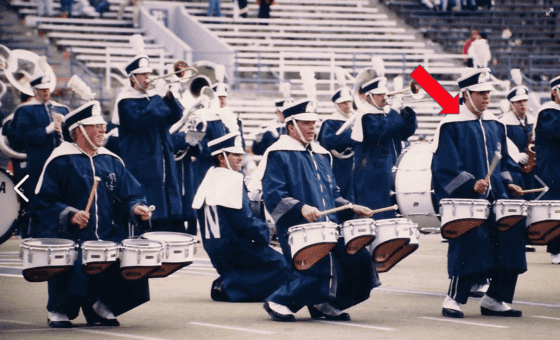 John W. Parks IV, pictured at left, is a Professor of Percussion at Florida State University. He was one of my favorite people during my time as an undergraduate student at Northwestern University. I played drums in the marching band there for four years.
John W. Parks IV, pictured at left, is a Professor of Percussion at Florida State University. He was one of my favorite people during my time as an undergraduate student at Northwestern University. I played drums in the marching band there for four years.
That's me on the right side of the photo below, see the red arrow. I clearly wasn't bending my knees enough compared to the other “quad” players (or they were bending their knees too much, ha ha). We didn't normally do that. But it was somehow part of the band's performance that week.

John was a graduate student during that time and served as the marching band drumline instructor for two of those years.
He was a coach, a teacher, and a mentor for us. There were times when John yelled at us, but he was never insulting or belittling. He wanted us to do better. He knew we could play better. He pushed us. But it came from a place of respect and caring.
I remember him yelling after we had played something in rehearsal, saying simply:
“Play it again! BETTER!”
That might not sound like the most helpful coaching. But, sometimes, what you need is repetition. You reflect on what you know you messed up or could have done better. He did more than yell, of course. He demonstrated technique and showed us what to do. He was a great coach.
John shared in our success. If I remember him yelling at us, I also remember him getting really excited, jumping up and down on the sidelines when we nailed it during a halftime performance. There was joy in that sense of accomplishment and getting there sometimes required John pushing us.
John recently wrote an op-ed piece in the Tallahassee Democrat paper. Poking the bear and criticizing anything involving Florida State football isn't the pathway to popularity in that town.
The article:
“Coaches should be held to same standards as teachers“
John writes, in part:
My 8-year-old son is obsessed with college football, watching games with me every weekend. On several occasions he was able to lip-read everything coaches screamed at players and officials. It started a conversation.
“Dad, why do coaches yell at the players with the f-word?”
“That's a good question.”
“Do you yell at your students like that?”
“Absolutely not. I respect them, and they respect me. That respect is not based on fear and intimidation.”
“Fear and what?”
Dr. W. Edwards Deming wrote about driving out fear from the workplace. I think that's a really important concept for our organizations today. There's so much dysfunction that results from fear and intimidation. Fear leads to people hiding problems and covering things up… which prevents improvement.
As I've blogged about (including here), the culture of fear and intimidation that I experienced at General Motors 20 years ago wasn't productive. It didn't lead to improvement. Yelling, screaming, spitting, and cursing didn't help improve anything.
I've written about this before in the context of college football:
Coaching, not Berating, when Mistakes are Made in Football (or the Workplace)
In this article, John adds:
“I never speak to my students in any other way than with deference, even when I might be upset. If I were to act like many of these coaches do, I am sure I would be fired. And rightly so.”
Like said, John, at times, yelled at us… but that was almost 25 years ago. We've all grown and matured since then. Like I said before, I never thought John was abusive or at all out of line. He acted like we were all part of team, rather than being our superior.
He adds:
“I think we can do better.”
He's right.
I think he also raises a good point that yelling and screaming often occurs in high-pressure settings. That's not an excuse, but it's an explanation. When I was at GM, leaders there would explain their bad behavior as something they were taught (through experience… that sort of bad behavior tends to get passed on or flows downhill, as they say).
Now, I've rarely seen people yell and scream in healthcare settings. It probably doesn't happen as much in modern factories. It's not a Lean behavior.
Hospitals often make excuses for surgeons or others who behave badly. They look the other way. They rationalize why harmful and disrespectful behavior isn't that bad. They too often don't want to lose the surgeon and the revenue they bring in. Thankfully, some hospitals are cracking down on that.
It's interesting to think about the need for other types of culture change and how organizations react when the issue is raised.
People resist and get defensive when somebody speaks an ugly truth (such as the fact that too many patients are harmed by preventable errors). There's often a backlash that occurs when somebody pushes, say, the need for a better patient safety culture in healthcare.
In this video, John reads some of the, um, feedback that he received from his piece. He has a good sense of humor about it:
If you read the book Leadership on the Line by Harvard professor Ronald Heifetz, he writes about how organizations will often turn on a change agent. Those invested in the status quo will often attack the messenger, as I think happened with John. They aren't debating the point (that football coaches shouldn't scream and curse)… they're attacking him personally. At least he can laugh at it.
What do you think? I should blog it again… BETTER?
Please scroll down (or click) to post a comment. Connect with me on LinkedIn.
Let’s work together to build a culture of continuous improvement and psychological safety. If you're a leader looking to create lasting change—not just projects—I help organizations:
- Engage people at all levels in sustainable improvement
- Shift from fear of mistakes to learning from them
- Apply Lean thinking in practical, people-centered ways
Interested in coaching or a keynote talk? Let’s start a conversation.

 John W. Parks IV, pictured at left, is a Professor of Percussion at Florida State University. He was one of my favorite people during my time as an undergraduate student at Northwestern University. I played drums in the marching band there for four years.
John W. Parks IV, pictured at left, is a Professor of Percussion at Florida State University. He was one of my favorite people during my time as an undergraduate student at Northwestern University. I played drums in the marching band there for four years.








![What’s Your Organization’s Real Mistake Policy? [Poll]](https://www.leanblog.org/wp-content/uploads/2025/07/Lean-Blog-Post-Cover-Image-2025-07-17T085114.134-100x75.jpg)

Great post, Mark. Many of the teachers throughout my time in NUMB (even if they didn’t deal directly with my section) knew how to motivate without demoralising and berating. It’s nice to see John doing well, as I remember how great the percussion section thrived under his leadership. Interestingly enough, even as a music major, I think some of my best musical accomplishments in college came in marching band, rather than voice, my primary major. Mostly because the leaders knew how to teach and lead. Just because someone is good at something (as all of my music professors were) doesn’t mean they know how to teach or inspire others to do the same. I had several professors who were fabulous performers or scholars but didn’t know to bring out the best in their students. Some of them did just the opposite.
The same goes for leaders/bosses in other areas of work. I’ve worked in many different types of jobs. I can say that nearly every boss I worked for was good at the area in which they worked. However, many of them were not good leaders.
Thanks for commenting, Leslie!
The whole “those who can do, and those who can’t teach” is such an annoying and incorrect cliché.
I’ve seen many fields where being a great individual performer doesn’t mean one knows how to lead. In my first career, a great engineer often made a terrible manager. You hear about that in software. In healthcare, great nurses or doctors often make terrible managers. They aren’t leaders… they just have the job title that implies they should be a leader.
Managing often means being an administrator or bureaucrat, while leaders need to be good teachers and coaches and they, ideally, know how to inspire others.
Some organizations shrug their shoulders, as if to say, “Well, what can you do?”
The best organizations realize that people can be taught and coached on how to be better teachers and coaches…
Being a big Spurs fan, I love this video about the relationship between Gregg Popovich and Tim Duncan. Did “Pop” curse at Duncan sometimes? Maybe.
But, I’m impressed that Pop took it upon himself to get to know Duncan, rather than just treating him as an asset. The respect, caring… and some would even say love between those two is probably a bit contributor to their winning together. It’s more than a sum of Tim’s talent and effort and Pop’s tactical skill and effort.
That’s leadership.
Mark:
Great post. It makes me think of the fact that we’re first “human beings” and not “human doings.” Susan Scott states in “Fierce Conversations,” that the conversation is the relationship. Our Lean Champion Teams just finished an in depth study of “Crucial Conversations,” which focuses on having a safe environment. As we show respect, in a safe environment, while building a relationship such as Pop and Tim created, the opportunity to grow becomes a reality. As a change agent, I’m not always popular because I’m like the parent who tells you to eat your green beans and drink plenty of water. Change is hard and that’s why we focus on “coaching,” more than simply “managing.” Excellent reflection and thanks for the post!